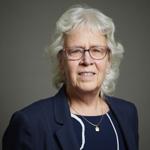
Baroness Blake of Leeds
Labour - Life peer
Became Member: 1st February 2021
Baroness in Waiting (HM Household) (Whip)
(since July 2024)
Baroness Blake of Leeds is not an officer of any APPGs
Baroness Blake of Leeds is not a member of any APPGs
8 Former APPG Officer Positions
Child of the North, City Regions Transport, Infrastructure, Organisation for Economic Co-operation and Development, Prepayment Meters, Rugby League, Sustainable Finance, Yorkshire and Northern Lincolnshire
Shadow Spokesperson (Energy and Net Zero)
21st Feb 2023 - 5th Jul 2024
Shadow Spokesperson (Business and Trade)
21st Feb 2023 - 5th Jul 2024
Opposition Whip (Lords)
18th May 2021 - 26th Oct 2023
Shadow Spokesperson (Business, Energy and Industrial Strategy and International Trade)
4th Dec 2021 - 20th Feb 2023
Shadow Spokesperson (Communities and Local Government)
19th Sep 2021 - 3rd Dec 2021
Shadow Spokesperson (Housing)
19th Sep 2021 - 3rd Dec 2021
Shadow Spokesperson (Communities and Local Government)
18th May 2021 - 18th Sep 2021
Shadow Spokesperson (Housing)
18th May 2021 - 18th Sep 2021
Division Voting information
During the current Parliament,
Baroness Blake of Leeds has voted in 258 divisions, and
never against the majority of their Party.
View All Baroness Blake of Leeds Division Votes
Debates during the 2024 Parliament
Speeches made during Parliamentary debates are recorded in Hansard. For ease of browsing we have grouped debates into individual, departmental and legislative categories.
Department Debates
Department for Work and Pensions
(32 debate contributions)
(32 debate contributions)
Cabinet Office
(26 debate contributions)
(26 debate contributions)
Department for Education
(20 debate contributions)
(20 debate contributions)
Department of Health and Social Care
(16 debate contributions)
(16 debate contributions)
Legislation Debates
Passenger Railway Services (Public Ownership) Act 2024
(4,604 words contributed)
(4,604 words contributed)
Football Governance Act 2025
(3,191 words contributed)
(3,191 words contributed)
Universal Credit (Standard Allowance Entitlement of Care Leavers) Bill [HL] 2024-26
(2,305 words contributed)
(2,305 words contributed)
Tobacco and Vapes Bill 2024-26
(1,606 words contributed)
(1,606 words contributed)
Lords initiatives
These initiatives were driven by Baroness Blake of Leeds, and are more likely to reflect personal policy preferences.
Baroness Blake of Leeds has not introduced any legislation before Parliament
Baroness Blake of Leeds has not co-sponsored any Bills in the current parliamentary sitting
Baroness Blake of Leeds has not asked any Written Questions in the current parliament